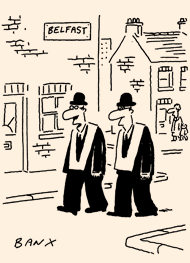A telling fortune to make on predictions
Roula Khalaf, Editor of the FT, selects her favourite stories in this weekly newsletter.
The forecasting business, it is often averred, is a mug’s game. But that is not true for everyone. For Michel Hayek, a Lebanese clairvoyant hailed as the Nostradamus of the Middle East, it seems to be a very good business indeed.
Each New Year’s eve, he appears on television to predict what the coming year holds. Beirut’s broadcasters bid ruinous sums to secure his services, while the losers field lesser oracles to steal some of the star soothsayer’s thunder. As the evening gets under way, Beirut pauses in mesmeric awe.
Are the Lebanese, so urbane on the surface, especially gullible, or does Mr Hayek, the son of a butcher from Mount Lebanon, really have a sixth sense, as he claims?
He does appear to have made some startling predictions. In 1985 he forecast the Challenger space shuttle explosion. In 1996 he foresaw an accident involving Diana, Princess of Wales. Most famously, in 2004, he warned of the attack in which Rafiq Hariri, the former prime minister of Lebanon, was assassinated. His notoriety grew so much he left the nation in consternation with no predictions for 2006. “After all the clamour surrounding my 2005 predictions and the rumours that spread later in my name, I have decided not to announce my predictions for this year,” he said. “I don’t want to be the reason people are afraid to go to the grocer or send their children to school.”

Hardly a calm year ahead, his followers intuited, and, in due course, Lebanon was engulfed in a war between Israel and Hizbollah, the Shia Islamist movement that operates as a state within the state. No wonder his predictions are set to background music appropriate to a disaster movie.
In 2013 Mr Hayek sees: “a reality change” in Syria (where the Assad dynasty is likely to fall); personnel changes at the top in Saudi Arabia (where the gerontocratic House of Saud faces a difficult succession); and the army returning to the political stage in Egypt (where the generals have only really retreated behind the arras). Almost anyone writing about the Middle East will have observed as much, but for more modest remuneration.
Many of his predictions, like most astrology, fall between the generic and the runic – molten plastic upon which anyone can imprint a personal stamp. Last year, for instance, his fans claim he predicted Manchester City would pip Manchester United for the English Premier League title. In fact, what he foresaw was “sadness in Manchester” because of a football competition – about as preternatural as saying this might involve a game with two halves.
The year before, he is credited with forecasting that Qatar would win its bid to host the 2022 football World Cup. What he really said was that Qatar would “excel at sports”. It hardly required psychic powers to observe the frenetic “sports” campaign and promises of largesse at which the Qataris were excelling.
Yet the bulk of Mr Hayek’s predictions concern Lebanon’s exceptionally narcissistic political class and, from a business point of view, one can see why. Much of the most startling pronouncement that Mr Hayek made this year was not on air but in a subsequent newspaper interview, in which he revealed that his services are retained by more than a third of Lebanese politicians, some of whom, he claimed, base their decisions on his predictions.
So now we know: Lebanon is run by a fortune teller.
…
Diana condolences
My personal hunch is that Michel Hayek’s real breakthrough came in 1997 with the death of Diana, Princess of Wales. I was in Beirut shortly afterwards and no one could talk of anything else; at any table for four you could hear five conspiracy theories. As I made my reporting rounds, I was everywhere presented with condolences: from Rafiq Hariri, the prime minister, to Cardinal Nasrallah Sfeir, the patriarch of the Maronite Church, down to the receptionist at the hotel.
I went to see Sayyed Hassan Nasrallah, leader of Hizbollah, thinking that here, at least, there would be no condolences mixed in with his forecasts – of the imminent defeat of Israel, the triumph of Iran’s brand of Islamism and so on. We finished and Mr Nasrallah, as always, left first, for security reasons. I was being escorted out when, suddenly, one of his bodyguards reappeared in the anteroom. “Sorry,” he said, “the Sayyed wishes to offer you his condolences …”
Comments